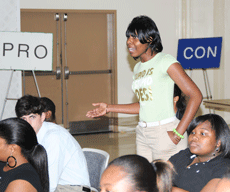Almost 250 students attended the speech forum Monday night to voice their opinions on the forum’s topic, “Resolved, that random drug testing should be conducted in all public schools and universities,” and in the end, those in opposition outnumbered supporters by a 132-113 vote. Students sat facing one another in the Cotillion Ballroom of the Bollinger Memorial Student Union while listening to the principal speakers argue their points on the issue.
Diana Riley, culinary arts sophomore from Thibodaux, spoke first in favor of the resolution.
The main points of her argument were that illegal drugs are not only dangerous but also punishable by law, students should be held responsible for their actions, the student and the community are the schools’ and universities’ responsibility and early intervention can produce positive results.
Riley spoke of the dangers of drug abuse, saying drugs are especially harmful to children and teenagers whose bodies are still developing.
“Illegal drugs can damage the brain, heart and other parts of [their bodies],” she said. “Cocaine, for instance, can cause a heart attack, even in a kid or teen.”
She also said drug use makes one less able to do well in school, sports or other activities.
Schools are supposed to be a place for students to interact with one another free of pressure to do drugs, Riley said.
“What is the purpose of a public school being categorized as a drug-free zone when the students themselves are not drug free?” Riley asked.
James Skinner, freshman from Albuquerque, N.M., spoke in opposition of random drug testing in public schools and universities.
He said the supporters of the resolution do not fully understand the issue being debated and miss the point of the forum.
“We’re not talking about drugs here,” he said.
According to Skinner, the topic of the forum is not about the use and dangers of drugs, but it is about the school-wide implementation of random drug testing, which he says is a violation of the Fourth Amendment of the U.S. Constitution.
“It being unconstitutional is not my only argument,” he said. “There happens to be better methods [of curbing drug use].”
Skinner said wanting to drug test students to help those with drug problems is a “great reason” to implement such policies, but it does not change the fact that Americans are protected from searches and seizures that are unwarranted or not performed due to probable cause.
Riley said mandated random drug testing might help attract students and parents to a certain university.
“Students and parents will want to choose a college that encourages students academic and social development and promotes campus and community safety,” she said.
Riley also brought up the issue of the schools’ responsibility to the students.
“Responsibility is placed in our leaders and educators who are trusted to do everything possible to provide students with a safe and secure environment where the values of discipline, hard work, responsibility and respect can be passed down to the students,” she said.
Skinner also spoke of responsibility, but he said random drug testing takes on a responsibility that belongs to parents and students.
“We don’t need the government to tell us what to do,” he said. “That is the parents’ responsibility and the students’ responsibility.
Riley touted early intervention as a benefit of drug screening students.
“Colleges and universities are implementing policies and programs to curb alcohol abuse and other drug use,” she said. “If a student tests positive, [he or she] may be able to receive the treatment that may lead to a successful recovery.”
She said the policies could be used as a response against peer pressure.
Skinner said rather than reacting to a problem, public schools and universities should be more proactive.
“Lets not try to be a secondary law enforcement. Lets make our programs tougher,” he said. “Maybe a 30-minute slideshow about drugs isn’t going to cut it.”
Skinner said punishing students who fail random drug tests is wrong because no crime has been witnessed, but the student may be subject to expulsion, and university students who are not refunded tuition are, in essence, being fined.








